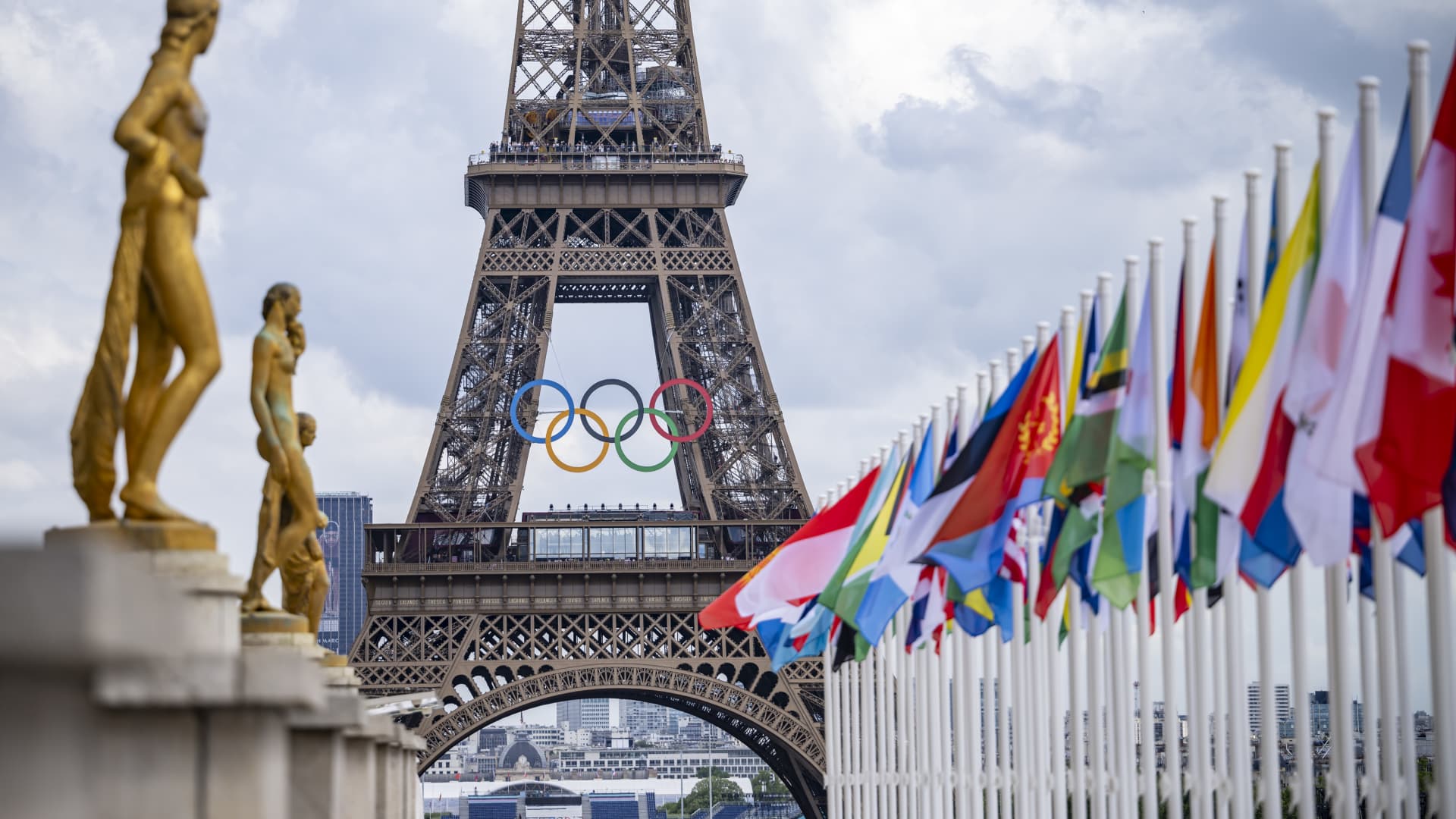Finance
Europe’s inflation spike is linked to the Olympics, Taylor Swift: UBS

A general view of the Eiffel Tower with the Olympic rings depicted with national flags of competing countries from the Place du Trocadero ahead of the Paris 2024 Olympic Games on July 21, 2024 in Paris, France.
Kevin Voigt | Getty Images Sports | Getty Images
The Olympic Games cause a rise in prices, but French consumers are unlikely to be affected.
Mega-events like the Olympic Games, or even major concerts like Taylor Swift’s Eras tour, lead to a surge in demand for hotel rooms and airline tickets, as well as other goods and services needed for the influx of visitors. Still, most consumers may not feel the impact, UBS said
Yet the data may suggest otherwise. That’s because the method for calculating changes in consumer prices could drive up rising costs in tourism-related sectors – such as hotels – and give a distorted picture.
“The Olympics or a Taylor Swift concert will cause a sudden demand shock,” wrote Paul Donovan, chief economist at UBS Global Wealth Management, in a recent analyst note. “It is more likely that the method of measuring these prices reflects the unusual and transient pattern of demand, and it is here that the rise in consumer price inflation is taking place.”
Taylor Swift performs on stage during The Eras Tour at Wembley Stadium on June 21, 2024 in London.
Kevin Mazur | Getty Images
This was already seen on the Eras Tour, as it increased hotel revenue in US cities where Swift performed.
This year, UK hotel prices rose in June, but Donovan said the higher costs “may have been borne by a select group of fans of Swift’s music” as the Eras Tour came to Wembley Stadium that month.
Meanwhile, the Summer Games are causing a similar phenomenon in Paris. “The tourists who flock to Paris for the Olympics and pay the price are not representative of French consumers,” he wrote.
A Parisian hotel boom?
Although hotels in the City of Light struggled in early July, with an estimated 60% drop in occupancy rates prompting hotels to cut rates, the trend has reversed during the Games. Hotel occupancy rates in Paris during the Olympics, which started on July 26 and last through Sunday, are higher than last year, according to global real estate data company CoStar. But in the days after the closing ceremony, hotel bookings in Paris are expected to drop from a year ago.
The city’s hotel sector has also seen huge price increases year-on-year. For each day during the first full week of this year’s Games, July 28 to August 3, CoStar saw 206% year-over-year growth in weekly revenue per available room. This was caused by an increase in the occupancy rate of 17.4 percentage points to 85.4% and an increase in the average daily rate (ADR) of 143%.
The Paris tourist office expects an occupancy rate of 86% from August 5 to Sunday.
A notable price increase has also been observed in other parts of France. In the surrounding ÃŽle-de-France region, CoStar found that ADR grew 83.4% in the week ending July 27 from a year ago. At the same time, occupancy rates in Paris fell by 5.7 percentage points year on year, while ADR rose by 90.8%.
“Does the average French person want to stay in Paris right now? No, absolutely not, unless he is crazy or going to the Olympics,” he told CNBC in an interview. “Most of them are not affected by the increase in prices.”
Olympic wins
That said, the Games attract huge numbers of tourists. In the first week alone, the Paris tourist office reported 1.73 million visitors in Greater Paris, an increase of 18.9% from 2023.
Of these, 924,000 were international tourists – an increase of around 14% on last year – with the largest number of foreign visitors coming from the US. French tourists coming to the city increased by 25.1% to 803,000 compared to last year.
In total, the tourist office estimates a total of 15.3 million visitors for the Olympic and Paralympic Games, with 11.3 million for the former and 4 million for the latter.
Tourists take selfies in front of the Arc de Triomphe on July 7, 2023 in Paris, France. Paris will host the Summer Olympics from July 26 to August 11, 2024
Matthias Hangst | Getty Images Sports | Getty Images
This comes as the Games record record ticket sales. The Paris 2024 Organizing Committee has noted that a total of 10.6 million tickets have been sold or allocated for the Olympic and Paralympic Games to date, of which at least 9.4 million for the Olympic Games and at least 1.2 million for the Paralympic Games . The previous record was held by the 1996 Atlanta Games, with 8.3 million copies sold or allocated.
“What you find very often is tourism that has nothing to do with the Olympiad falls off the edge of a cliff,” Donovan told CNBC, adding that this is what sets the Eras Tour apart from other mega-events. “It’s a demand shock, but it’s a narrow-focus demand shock, which is kind of a problem on the inflation side because you create a concentrated period of absolutely supernormal demand. The price mechanism is basically running on bananas.”
Demand fluctuations have also been observed in other related sectors of the Parisian economy, such as the aviation sector. Despite some airlines forecasting a decline in third-quarter revenue due to lower traffic to Paris this summer, Visa recently forecast a decline in revenue facts shows that flight bookings to the city in the period leading up to the Olympic Games increased by 39% compared to the period a year ago.
Tourists pass a banner with the Paris 2024 logo before the start of the Paris 2024 Olympic and Paralympic Games on June 17, 2024 in Paris, France.
Schasnot |Â
Small businesses in the city have also seen gains. Visa found that these companies saw a 26% year-over-year increase in revenue from cardholders during the first weekend of the Games.
While the long-term economic impact of the Paris Olympics is still uncertain, Donovan expects that “on balance it will probably be positive,” citing past Games where tourism has boomed, such as Barcelona in 1992. can be a boost,” he said, noting that the Summer Olympics tend to have more appeal than the Winter Olympics in general.
Paris 2024 could generate as much as $12 billion (or €11.1 billion) in economic impact in the longer term. recent study of the Center for Law and Economics of Sport estimated. The International Olympic Committee said even more value could be created at the next two Summer Olympics.
“What we see is that the economic impact of the Games is very substantial,” said Christophe Dubi, executive director of the Olympic Games. “This is an injection of resources into the local economy that will have a profound impact now and into the future.”
The reforms of the IOC’s Agenda 2020 have helped make the events more economically sustainable, said Victor Matheson, an economist and professor at the College of the Holy Cross.
These are expected to be the first summer games less than $10 billion since Sydney 2000. Money was saved by where 95% of the locations are already existing or temporary and the strategy could mark a “turning point” for the Olympic movement, Matheson said.
“The IOC has allowed Paris to host an Olympic Games that doesn’t build these billion-dollar monuments at the Olympic Games and doesn’t gold-plat everything there,” he said. “Things like that that can drive up costs quite quickly don’t seem to do that.”
Disclosure: CNBC parent company NBCUniversal owns NBC Sports and NBC Olympics. NBC Olympics is the U.S. broadcast rights holder for all summer and winter games through 2032.











